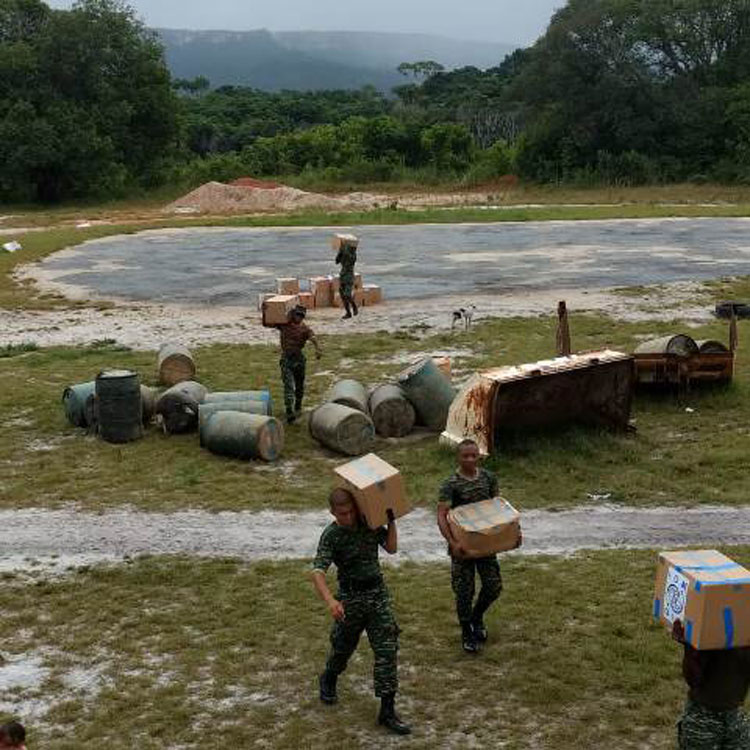The entry of police and Guyana Defence Force (GDF) soldiers into Kaikan Village, in Region Seven, has caused significant security and social problems, according to residents, who say women have been sexually assaulted and villagers have been threatened and intimidated, a recent study by the Amerindian Peoples Association’s (APA) into the land tenure situation of indigenous communities in the region has revealed.
Kaikan is a small village that has a population of approximately 72 households or 385 people, who are mostly Akawaio mixed with Waika and Arecuna, and the report says they are currently facing significant conflicts with police, soldiers, miners and Venezuelans occupying their traditional lands.
“The GDF had entered the village during border patrols and remained, claiming to be providing security for the airstrip. The village has complained over the years that women in the community have been sexually assaulted and that… soldiers have had relationships with married women, causing strife. Village residents additionally report being threatened and intimidated by soldiers when they try to protect their daughters from soldiers who come uninvited to their homes,” the report, which was recently launched, explained.
It also claimed that police and soldiers have also stolen from the village over the years and have broken into village shops to steal food and other times, and recently have also been taking advantage of Venezuelan prostitutes – taking away their identity cards and forcing them to have sex in order to have their documents returned.
“Village residents note that they understand the army is supposed to be providing security for the village because they are on the border with Venezuela. Although some residents report being concerned about escalating tensions between Guyana and Venezuela, they also note that the GDF’s presence is unnecessary because they do not provide additional security beyond what the village council and Community Policing Group already provide. Instead, the GDF is causing additional problems in the village,” the report added.
It said that the presence of the army base in the village centre directly next to the school is causing Venezuelan helicopter flyovers and the village has requested many times that the army barracks be removed from the village and should be moved so it is no longer in the village centre and next to the school.
The report said the village is also concerned about the influx of migrants from Venezuela who have been fleeing to trade or work in the mines and residents have linked the migration to an increase in crime.
“There have been increased thefts in the village, along with illegal drug smuggling and trafficking of unlicensed guns through and around the village. There is a ‘kayamu’ (brothel) that has been established just across the Tshuau (Carak Paru) and army soldiers also bring prostitutes into the village at the army base. The increased number of outsiders is also spreading some diseases in the village. The Venezuelans coming across the border are not indigenous,” it noted.
The report further said that the village has serious issues with mining concessions, despite a government website stating that there are no mining concessions inside the village’s title. However, the report noted that it is surrounded by medium-scale mining concessions. It said that miners are causing a series of problems that prevent free movement within the village lands, including erecting fences around their mining camps.
“For example, miners working for a Mr. Mohan in the Karabo (Tshuau) area – which is within the village’s title description but excluded from the village’s grant plan due to the incorrectly labelled creek – are blocking residents from passing along their traditional trails. The village reports that the concession is not actually owned by Mr. Mohan, but he had been contracted to work there by the original concession owner, Paul Mortimer, who is now deceased. Miners also block residents from doing traditional mining, forcing village residents to find alternate sites to work,” the report explained.
It also noted that residents report that the areas covered in the mining concessions are important resources for the village, and they have plans to do cattle rearing and eco-tourism in the area east of the Tshuau (Carak Paru) but are unhappy that mining activities are causing damage and loss to an area that has significant farming and tourism potential.
As a result, the report recommended that the government must recognise all of the village’s traditional lands prior to demarcating them; must stop issuing mining and other concessions on indigenous traditional lands; must revoke all mining concessions previously granted on the traditional lands; must ensure that miners repair all roads and trails they have damaged through their mining activities; and that contractors repair any damage done when they were contracted to upgrade the airstrip.
The report also recommended that the government remove the army and police from the village immediately and instead pay the village Community Policing Group a stipend.
It said too that there is a need to update the laws to provide for all indigenous traditional lands being legally recognised and titled and to provide that villages do not need to demarcate their existing titles prior to seeking a correction or extension to their title.
It added that the government must update and correct its maps to ensure that they reflect what is described in the title document; ensure that its agencies provide adequate support to indigenous village councils and ensure that villages are included in national programme consultations, engagements and discussions.
The report recommended too that the government must include effective participation of the village in any future projects affecting it, must involve residents in those projects; the village council must follow up and pressure the government to ensure that all of the village’s traditional lands are legally recognised; the village council must hold regular meetings for the village to discuss their land issues and that the National Toshaos Council should visit the village more frequently so that it can hear from the people and make informed recommendations to the government.






